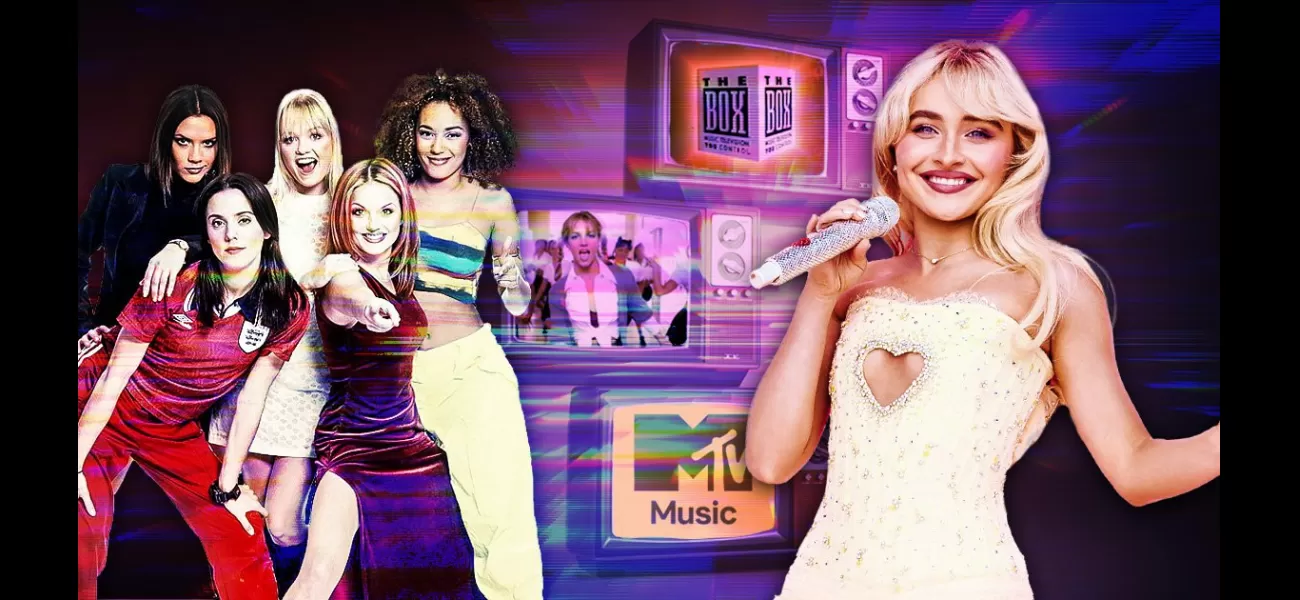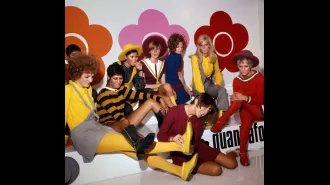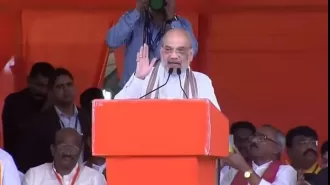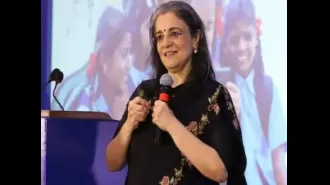Music channels died because the music channels themselves were the cause of their own demise.
TV shows used to be popular, but now they are not doing as well.
July 13th 2024.

In the past, music channels held a special place in the hearts of viewers. They were the go-to source for watching the latest music videos and keeping up with the trends. It was a time when trying to imitate Britney Spears' dance moves from her newest hit or admiring Amy Lee's grace in the "Bring Me To Life" music video was a common occurrence among TV viewers.
These channels provided a convenient way for both casual fans and die-hard groupies to catch back-to-back videos at any time of the day. The demand for music channels was so high that at one point, there were a whopping 40 channels dedicated solely to music videos.
However, things have drastically changed and the discs have stopped spinning. Some of the biggest names in the genre, like Kerrang, The Box, 4Music, Kiss, and Magic, have closed their doors in June 2024. Even Channel 4, a major player in the industry, stated that these channels were no longer profitable enough to continue. It seems like the party is well and truly over.
For those of us who grew up watching the chart countdown every morning before school, it feels like a tragic loss. Even The Agency's TV Editor, Adam Miller, will miss these channels, as he first discovered them during a sick day. "Unlike Rishi Sunak, I was lucky enough to have Sky TV," he joked. "I remember seeing TLC's 'Waterfalls' on MTV and being immediately mesmerized. From then on, I was glued to the TV all day, watching videos from artists like the Beastie Boys, Chemical Brothers, and Massive Attack. Music videos were like works of art, and it didn't even matter if you liked the song or the artist, you couldn't help but be transfixed by them."
Music channels were more than just a source of entertainment; for many, they were a way of life. Carl Smith, for example, saw the Spice Girls' "Wannabe" music video while walking past a TV for sale in a shopping center electronics store. That moment sparked his love for girl bands, music channels, and eventually led to his career as the Official Charts editor.
The national obsession with music channels meant that they had the power to catapult artists to stardom at an incredible speed. Britney Spears, for instance, became a household name overnight thanks to her iconic schoolgirl video for "Hit Me Baby...One More Time." This video was continuously played on MTV, while Channel U, founded by the late Darren Platt in 2003, gave grime artists like Dizzee Rascal, Skepta, and Ghetts a platform to break into the mainstream.
Viewers also felt like they were part of a community, as they could text in their requests and sometimes even leave a short message. "It was almost like social media before social media," recalled Adam.
MTV, a frontrunner in the music channel world, catered to every type of viewer with channels specializing in dance music, indie rock, pop, and R&B. However, now, their reduced channels mainly offer shows like "Catfish," "Teen Mom," and "Ex on the Beach." While these are certainly entertaining, it's not quite the same as dancing along to music videos like we used to.
Remember when the Spice Girls had a dream and access to a hotel staircase? Well, that staircase ended up being the setting for their iconic "Wannabe" music video. This video was first aired on The Box, one of the pioneers of music channels in the UK. Unfortunately, The Box was one of the many channels to shut down last month, much to the disappointment of Vincent Monsey, who brought the channel to the UK with his partner Liz Laskowski in 1992.
Vincent was inspired to start The Box after stumbling upon Jukebox Network while staying at a friend's house in Miami. It was the middle of the night, and while he may have been tired before grabbing the remote, the discovery woke Vincent up, and he had the idea to bring the music channel across the pond. With his previous experience on Radio Caroline, he had the connections to make it happen, and in less than a year, The Box was born. It didn't take long for the channel to have a significant impact on the music industry.
"We were the first people ever to show the Spice Girls," Vincent proudly stated to The Agency. "They came into my office and sang for me. I liked them, so I agreed to put their record 'Wannabe' on the channel. However, there was a problem - they didn't have a music video. So, I told them to go shoot one. With time against them, they ran up and down a set of stairs in a hotel with a single camera operator. The video wasn't even finished when they sent it to me, but we aired it anyway. It quickly started getting 3000 viewer votes every day, while a typical video would only get that many in a week. The Spice Girls' record label, Virgin Records, asked us to pull back and air the new video, but it was too late - the response was overwhelming."
Vincent then excitedly listed all the artists that were "launched" in the UK on his channel, including Meatloaf, Snoop Dog, Peter Andre, Destiny's Child, Backstreet Boys, and Celine Dion, shortly after our phone conversation. "Many of these artists didn't have a following outside of their own country, but we helped break them into the UK market. It was a mutually beneficial relationship between us and their promoters - we got content, and they got exposure."
However, Vincent noted that the industry has changed significantly since then. "It used to be a fun business to be in," he said. "The people behind the artists were real characters, but now it's all corporate." Of course, music channels aren't the only ones struggling with the shift away from linear TV. Everything from election coverage to reality shows has been affected. However, the music genre feels like it's become particularly outdated with the rise of platforms like YouTube. While YouTube can offer a variety of music videos, it just can't recreate the magic of watching them on TV.
It's a sad reality, but the content on MTV is no longer just music. The channel has had to adapt to survive, and it now mainly airs shows like "Catfish," "Teen Mom," and "Ex on the Beach." While these shows can be entertaining, it's not quite the same as watching music videos all day.
The era of music channels has come and gone, leaving behind a bittersweet nostalgia for the days of endlessly watching and imitating our favorite artists' latest dance moves. It used to be a staple of TV viewership, with channels like MTV, Kerrang, and The Box providing a constant stream of music videos for both casual fans and die-hard groupies to enjoy at any time of the day. In fact, at one point in the early 2000s, there were a whopping 40 channels dedicated solely to music videos.
But now, the music has stopped and the channels have shut down. In June 2024, some of the biggest names in the genre, such as Kerrang, The Box, 4Music, Kiss, and Magic, closed their doors for good. According to Channel 4, the decision was due to a lack of sufficient scale to generate a meaningful return on investment, signaling the end of an era.
For those of us who grew up watching the chart countdown every morning before school, it feels like a tragic loss. Even our very own TV Editor, Adam Miller, will miss them dearly. He recalls first discovering the channels during a sick day and being immediately hooked by the hypnotic videos of TLC's "Waterfalls", the Beastie Boys' "Intergalactic", and Massive Attack's "Teardrop". These videos were like works of art, captivating viewers regardless of whether they even liked the song or artist.
The influence of music channels extended far beyond just entertainment. They played a crucial role in launching the careers of countless artists, with many becoming household names overnight thanks to the exposure they received on these channels. Take Britney Spears, for example, whose iconic schoolgirl video for "Hit Me Baby One More Time" was played on repeat on MTV, instantly propelling her to stardom. And let's not forget Channel U, which gave grime artists like Dizzee Rascal, Skepta, and Ghetts a platform to break into the mainstream.
But it wasn't just about the artists; music channels also brought viewers together, creating a sense of community before the days of social media. People could even text in requests and sometimes even leave a short message. It was a time when MTV, the frontrunner of music channels, catered to every taste with channels specializing in dance, indie, pop, and R&B. Now, their reduced channels are filled with shows like "Catfish", "Teen Mom", and "Ex on the Beach", which may be entertaining, but certainly not the same as dancing along to a music video.
The Box, one of the pioneers of music channels, was among the many to shut down last month, leaving Vincent Monsey, who brought the channel to the UK with his partner Liz Laskowski in 1992, feeling gutted. Vincent was inspired to create the channel after stumbling upon Jukebox Network while staying at a friend's house in Miami. With his previous experience on Radio Caroline, he had the connections and know-how to bring his vision to life in less than a year. And soon enough, The Box had real power in the music industry.
Vincent proudly recalls being the first to showcase the Spice Girls, who came into his office and sang their hearts out. He agreed to put their record "Wannabe" on the channel, but there was one problem – they didn't have a music video. So, he told them to go shoot one. With time running out, they ended up filming a simple video of them running up and down a hotel staircase with just one camera operator. But it was enough to capture the hearts of viewers, and the video quickly became a fan favorite, receiving thousands of votes every day.
The success of the Spice Girls on The Box was just the beginning. The channel also launched the careers of artists like Meat Loaf, Snoop Dog, Peter Andre, Destiny's Child, Backstreet Boys, and Celine Dion. Vincent proudly states that many of these artists didn't have a reach outside of their home countries until The Box gave them the exposure they needed to break into the UK market.
But as with all good things, the magic eventually faded. Vincent admits that the industry has become more corporate, and the days of fun and excitement are gone. And while music channels may not be the only ones suffering from the shift away from linear TV, they seem to be one of the most affected. Sure, we now have platforms like YouTube, but they just can't recreate the magic of flipping through channels and stumbling upon a music video that captivates us.
MTV, once a mecca for music videos, has also had to adapt to survive. But it's not the same. The content is no longer always music, and while shows like "Catfish" may be entertaining, they just can't compete with the feeling of watching our favorite artists' videos back-to-back on a music channel. So, as we bid farewell to the music channels of yesteryear, we can't help but feel a sense of loss for the simple joy they brought to our lives.
These channels provided a convenient way for both casual fans and die-hard groupies to catch back-to-back videos at any time of the day. The demand for music channels was so high that at one point, there were a whopping 40 channels dedicated solely to music videos.
However, things have drastically changed and the discs have stopped spinning. Some of the biggest names in the genre, like Kerrang, The Box, 4Music, Kiss, and Magic, have closed their doors in June 2024. Even Channel 4, a major player in the industry, stated that these channels were no longer profitable enough to continue. It seems like the party is well and truly over.
For those of us who grew up watching the chart countdown every morning before school, it feels like a tragic loss. Even The Agency's TV Editor, Adam Miller, will miss these channels, as he first discovered them during a sick day. "Unlike Rishi Sunak, I was lucky enough to have Sky TV," he joked. "I remember seeing TLC's 'Waterfalls' on MTV and being immediately mesmerized. From then on, I was glued to the TV all day, watching videos from artists like the Beastie Boys, Chemical Brothers, and Massive Attack. Music videos were like works of art, and it didn't even matter if you liked the song or the artist, you couldn't help but be transfixed by them."
Music channels were more than just a source of entertainment; for many, they were a way of life. Carl Smith, for example, saw the Spice Girls' "Wannabe" music video while walking past a TV for sale in a shopping center electronics store. That moment sparked his love for girl bands, music channels, and eventually led to his career as the Official Charts editor.
The national obsession with music channels meant that they had the power to catapult artists to stardom at an incredible speed. Britney Spears, for instance, became a household name overnight thanks to her iconic schoolgirl video for "Hit Me Baby...One More Time." This video was continuously played on MTV, while Channel U, founded by the late Darren Platt in 2003, gave grime artists like Dizzee Rascal, Skepta, and Ghetts a platform to break into the mainstream.
Viewers also felt like they were part of a community, as they could text in their requests and sometimes even leave a short message. "It was almost like social media before social media," recalled Adam.
MTV, a frontrunner in the music channel world, catered to every type of viewer with channels specializing in dance music, indie rock, pop, and R&B. However, now, their reduced channels mainly offer shows like "Catfish," "Teen Mom," and "Ex on the Beach." While these are certainly entertaining, it's not quite the same as dancing along to music videos like we used to.
Remember when the Spice Girls had a dream and access to a hotel staircase? Well, that staircase ended up being the setting for their iconic "Wannabe" music video. This video was first aired on The Box, one of the pioneers of music channels in the UK. Unfortunately, The Box was one of the many channels to shut down last month, much to the disappointment of Vincent Monsey, who brought the channel to the UK with his partner Liz Laskowski in 1992.
Vincent was inspired to start The Box after stumbling upon Jukebox Network while staying at a friend's house in Miami. It was the middle of the night, and while he may have been tired before grabbing the remote, the discovery woke Vincent up, and he had the idea to bring the music channel across the pond. With his previous experience on Radio Caroline, he had the connections to make it happen, and in less than a year, The Box was born. It didn't take long for the channel to have a significant impact on the music industry.
"We were the first people ever to show the Spice Girls," Vincent proudly stated to The Agency. "They came into my office and sang for me. I liked them, so I agreed to put their record 'Wannabe' on the channel. However, there was a problem - they didn't have a music video. So, I told them to go shoot one. With time against them, they ran up and down a set of stairs in a hotel with a single camera operator. The video wasn't even finished when they sent it to me, but we aired it anyway. It quickly started getting 3000 viewer votes every day, while a typical video would only get that many in a week. The Spice Girls' record label, Virgin Records, asked us to pull back and air the new video, but it was too late - the response was overwhelming."
Vincent then excitedly listed all the artists that were "launched" in the UK on his channel, including Meatloaf, Snoop Dog, Peter Andre, Destiny's Child, Backstreet Boys, and Celine Dion, shortly after our phone conversation. "Many of these artists didn't have a following outside of their own country, but we helped break them into the UK market. It was a mutually beneficial relationship between us and their promoters - we got content, and they got exposure."
However, Vincent noted that the industry has changed significantly since then. "It used to be a fun business to be in," he said. "The people behind the artists were real characters, but now it's all corporate." Of course, music channels aren't the only ones struggling with the shift away from linear TV. Everything from election coverage to reality shows has been affected. However, the music genre feels like it's become particularly outdated with the rise of platforms like YouTube. While YouTube can offer a variety of music videos, it just can't recreate the magic of watching them on TV.
It's a sad reality, but the content on MTV is no longer just music. The channel has had to adapt to survive, and it now mainly airs shows like "Catfish," "Teen Mom," and "Ex on the Beach." While these shows can be entertaining, it's not quite the same as watching music videos all day.
The era of music channels has come and gone, leaving behind a bittersweet nostalgia for the days of endlessly watching and imitating our favorite artists' latest dance moves. It used to be a staple of TV viewership, with channels like MTV, Kerrang, and The Box providing a constant stream of music videos for both casual fans and die-hard groupies to enjoy at any time of the day. In fact, at one point in the early 2000s, there were a whopping 40 channels dedicated solely to music videos.
But now, the music has stopped and the channels have shut down. In June 2024, some of the biggest names in the genre, such as Kerrang, The Box, 4Music, Kiss, and Magic, closed their doors for good. According to Channel 4, the decision was due to a lack of sufficient scale to generate a meaningful return on investment, signaling the end of an era.
For those of us who grew up watching the chart countdown every morning before school, it feels like a tragic loss. Even our very own TV Editor, Adam Miller, will miss them dearly. He recalls first discovering the channels during a sick day and being immediately hooked by the hypnotic videos of TLC's "Waterfalls", the Beastie Boys' "Intergalactic", and Massive Attack's "Teardrop". These videos were like works of art, captivating viewers regardless of whether they even liked the song or artist.
The influence of music channels extended far beyond just entertainment. They played a crucial role in launching the careers of countless artists, with many becoming household names overnight thanks to the exposure they received on these channels. Take Britney Spears, for example, whose iconic schoolgirl video for "Hit Me Baby One More Time" was played on repeat on MTV, instantly propelling her to stardom. And let's not forget Channel U, which gave grime artists like Dizzee Rascal, Skepta, and Ghetts a platform to break into the mainstream.
But it wasn't just about the artists; music channels also brought viewers together, creating a sense of community before the days of social media. People could even text in requests and sometimes even leave a short message. It was a time when MTV, the frontrunner of music channels, catered to every taste with channels specializing in dance, indie, pop, and R&B. Now, their reduced channels are filled with shows like "Catfish", "Teen Mom", and "Ex on the Beach", which may be entertaining, but certainly not the same as dancing along to a music video.
The Box, one of the pioneers of music channels, was among the many to shut down last month, leaving Vincent Monsey, who brought the channel to the UK with his partner Liz Laskowski in 1992, feeling gutted. Vincent was inspired to create the channel after stumbling upon Jukebox Network while staying at a friend's house in Miami. With his previous experience on Radio Caroline, he had the connections and know-how to bring his vision to life in less than a year. And soon enough, The Box had real power in the music industry.
Vincent proudly recalls being the first to showcase the Spice Girls, who came into his office and sang their hearts out. He agreed to put their record "Wannabe" on the channel, but there was one problem – they didn't have a music video. So, he told them to go shoot one. With time running out, they ended up filming a simple video of them running up and down a hotel staircase with just one camera operator. But it was enough to capture the hearts of viewers, and the video quickly became a fan favorite, receiving thousands of votes every day.
The success of the Spice Girls on The Box was just the beginning. The channel also launched the careers of artists like Meat Loaf, Snoop Dog, Peter Andre, Destiny's Child, Backstreet Boys, and Celine Dion. Vincent proudly states that many of these artists didn't have a reach outside of their home countries until The Box gave them the exposure they needed to break into the UK market.
But as with all good things, the magic eventually faded. Vincent admits that the industry has become more corporate, and the days of fun and excitement are gone. And while music channels may not be the only ones suffering from the shift away from linear TV, they seem to be one of the most affected. Sure, we now have platforms like YouTube, but they just can't recreate the magic of flipping through channels and stumbling upon a music video that captivates us.
MTV, once a mecca for music videos, has also had to adapt to survive. But it's not the same. The content is no longer always music, and while shows like "Catfish" may be entertaining, they just can't compete with the feeling of watching our favorite artists' videos back-to-back on a music channel. So, as we bid farewell to the music channels of yesteryear, we can't help but feel a sense of loss for the simple joy they brought to our lives.
[This article has been trending online recently and has been generated with AI. Your feed is customized.]
[Generative AI is experimental.]
0
0
Submit Comment





